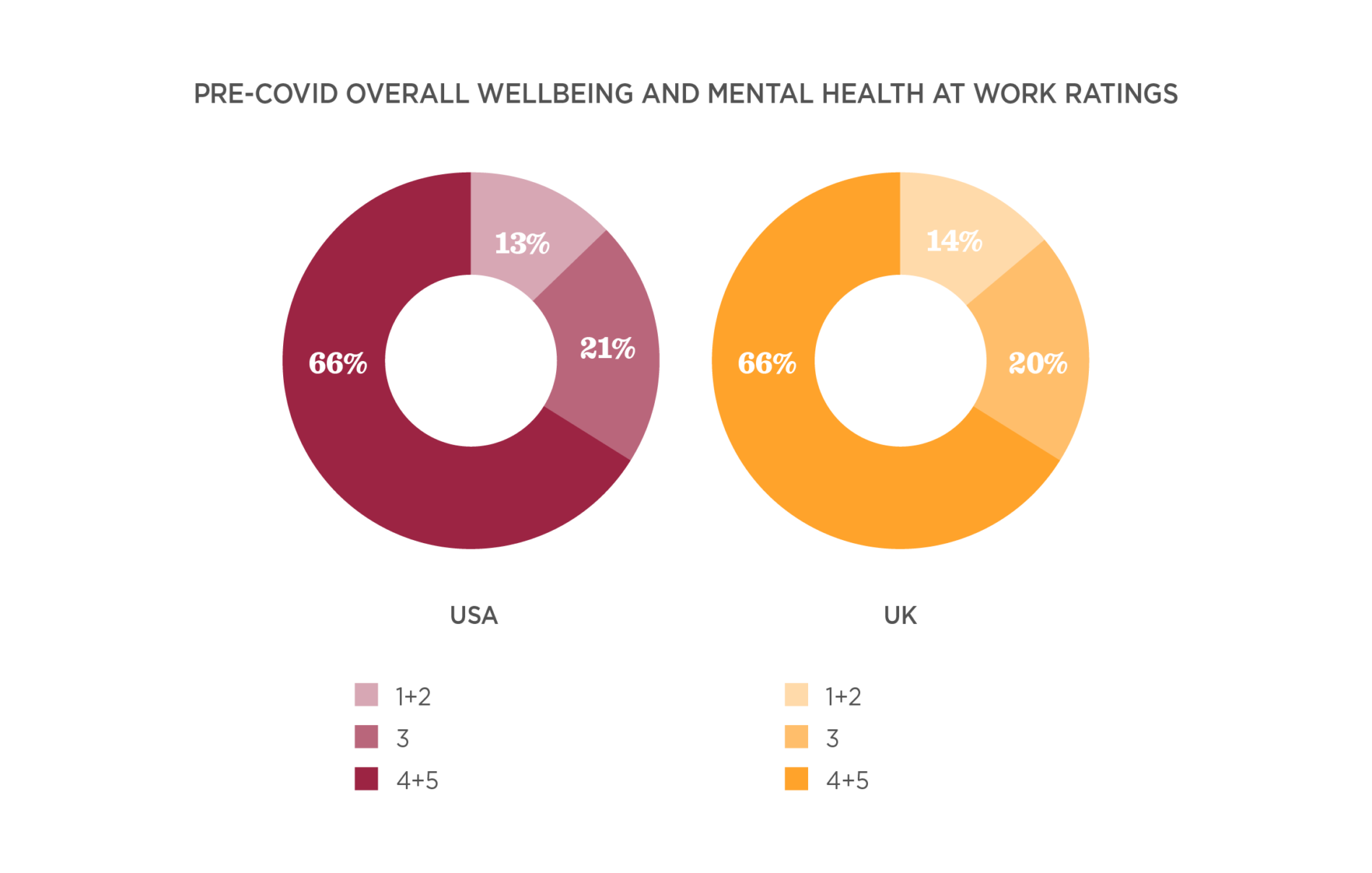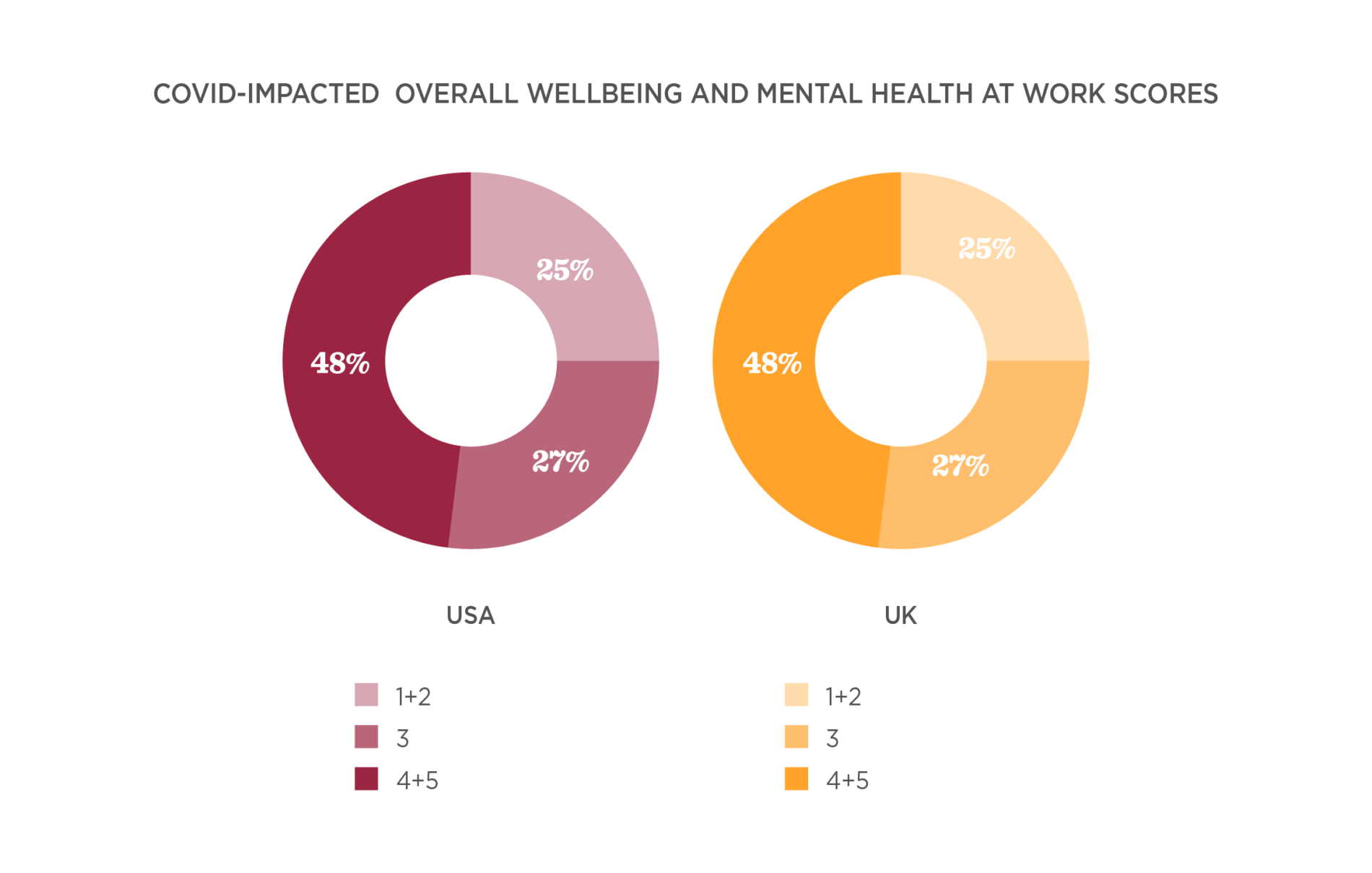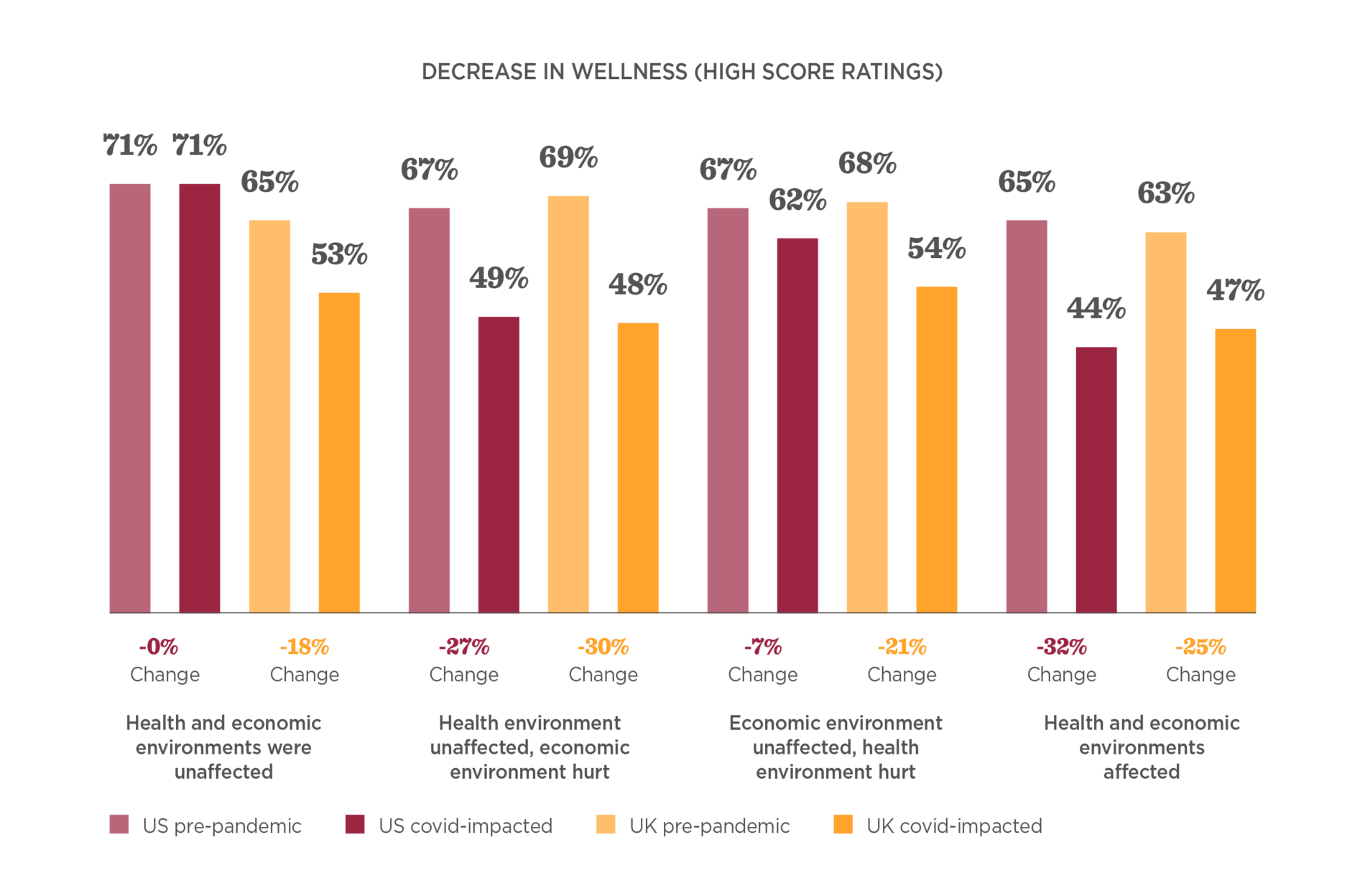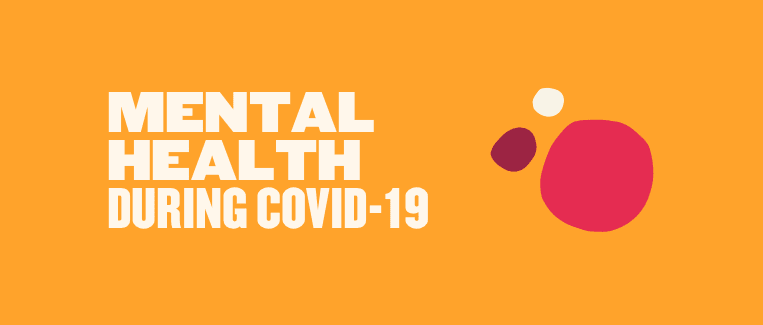Across continents, genders, and seniority levels, it seems we’re all feeling the same thing: we’re having a hard time.
We checked in with 2000 workers across the US and UK about their mental health at work and how it’s been affected by the pandemic. To get the full picture we surveyed full-time employees from all walks of life, spanning different industries, seniority levels, and genders, and talked to them about how their lives have changed since COVID-19 took over the world.
We discovered that, across the board, we’ve all been impacted by COVID-19. In both the US and the UK, there was a staggering 27% drop in self-reported mental wellness in the workplace across all segments and populations, and for more reasons than you might think.
Even if you personally weren’t affected financially or physically, you probably know people who were—and that can be enough to wear you, and your people, down.
To understand the impact of external circumstances on our performance, we asked respondents to tell us not only about their mental wellness, but also about changes in health and economic circumstances that they and their loved ones are experiencing.
Want to learn about how your people are feeling? Read on.
Setting a baseline
Before the pandemic, it seems like employee wellbeing was pretty high. In both the US and the UK, 66% of employees said that before the pandemic they were doing well at work, ranking their happiness at a 4-5 out of a five-point scale. Only 13% of American employees and 14% of British employees said they were extremely unhappy at work, ranking themselves at a 1-2.

Post-COVID unhappiness
Across the board, everyone’s wellness scores tanked after COVID hit. That happy 66% of the workforce dropped down to 48% both in the US and UK.
This drop was seen across the board, including all genders and rankings. Where we did see nuance, however, is in discussions of out-of-office changes.

We asked participants to tell us whether COVID has impacted them physically (ie. their health or the health of a loved one) or economically (their finances or a loved one’s). They responded either:
- Health and economic environments unaffected
- Health environment unaffected, economic environment affected
- Health environment affected, economic environment unaffected
- Health and economic environments affected
Health and economic environments unaffected
These respondents seemed to be pretty happy before the pandemic began. 71% of Americans responded that they were doing well or very well at work; 65% of Brits said the same.
Who are the people who came out of COVID physically and financially unscathed? It can be assumed that these are the folks with the most economic security: the ones who can afford the best healthcare and work in industries or roles that weren’t directly impacted by the COVID crisis. Of course their work lives were good: they were well-compensated and taken care of.
Even these people, however, weren’t invincible to COVID’s impact.
At least not the British ones. While the American percentage of happy folks stayed the same, we can see a 12-point drop in the British percentage. Could it be because the British feel more connected to each other and their outside environment? Or because they’re more sensitive to the global climate?
Whatever it is: even the well-off are having a tough go of it in the UK.
Health environment unaffected, economic environment affected
Before the pandemic, these were a happy bunch, with 67% of American respondents and 69% of Brits in this group saying they were doing well or very well.
In both countries, however, these numbers dropped precipitously for those hit by COVID-related economic troubles.
A 20-point drop can’t be ignored. Without financial security, Maslow says, we can’t focus on enjoyment—so employees experiencing financial setbacks (their own or a loved one’s) can’t be expected to work at their maximum.
Health environment affected, economic environment unaffected
Interestingly enough, this group of people was the least severely unhappy in the US before the pandemic, with only 8% rating themselves a 1-2 on the five-point wellness scale. In the UK, 12% rated themselves a 1-2, coming in second only to those whose economic and health environments remained unaffected. 67% of Americans in this category surveyed and 68% of Brits reported feeling great.
After the pandemic, however, things got complicated.
In the US, this formerly high-satisfaction group took a turn for the worst, with 18% of them reporting feeling severely or completely unwell (as opposed to 8% pre-pandemic). In the UK the percentage of low-wellness folks stayed stagnant, but the percentage of high-satisfaction folks dropped by 14%.
While folks in the UK seem to be more impacted by their surroundings, the state of the American healthcare system makes Americans more sensitive to health-related issues. While the Brits are covered in the event of a health-related catastrophe, Americans have a lot more to worry about.
Recommended For Further Reading
Health and economic environments affected
This group suffered the worst of what COVID brought us: both financial and health losses. This group was the weakest before the pandemic, with nearly 15% in both countries reporting extreme dissatisfaction and unwellness and the least of all groups reporting high wellness scores.
Who’s in this group? Why were their pre-pandemic wellness scores so low?
The folks who are most impacted by illness and loss are the ones most vulnerable to it. The struggles of this group didn’t start with COVID-19; they were around long before.
And yet, somehow COVID made their struggles worse. The percentage of struggling workers reporting extreme dissatisfaction doubled to 27% in both countries, and the percentage reporting high wellbeing scores dropped to under 50%.

Identifying employees who need your attention
While we all have been impacted by COVID, the employees we see suffering the most are the ones who had the hardest time before the pandemic.
To help all of your people stay mentally and physically healthy, you need to get to know who they are inside and outside of the office. None of us are islands, and it’s enough for a family member or loved one to lose income or get sick for our own performance to be impacted.
Keep a close eye on your people. We’re all a little bit vulnerable right now.


